Elephant Mali’s death sheds light on harmful impacts of zoos – group

FILE PHOTO: Breakfast is a tall grass pile for Manila Zoo’s most popular resident, Mali. There are over 600 other animals in the zoo but Mali is the only elephant. PHILIPPINE DAILY INQUIRER / EDWIN BACASMAS
MANILA, Philippines — An animal welfare advocacy group said the death of Mali, the country’s one and only elephant at the Manila Zoo, serves as a reminder of the harm caused by captive wildlife exhibits.
The Earth Island Institute Philippines (EIIPH) stressed that wild animals like Mali belong in their natural habitats and “not as captive spectacles for human amusement.”
EIIPH expressed regret over Mali’s demise.
“Her life was confined within the boundaries of a small, barren enclosure, a stark contrast to the vast landscapes and rich social connections that define an elephant’s natural existence,” EIIPH said in a statement on Thursday, November 30.
Vishamali, popularly known as Mali, died on Tuesday after four decades of living inside an enclosure at Manila Zoo.
According to EIIPH, Mali was taken away from her family in Sri Lanka at the age of three and was gifted to then-first lady Imelda Marcos in 1977.
READ: Manila Zoo chief vet: Elephant Mali may have died of heart failure
EIIPH said elephants form strong bonds within their families and herds and wander territories to look for sustenance and companionship, as they are considered epitome of social unity. It also said elephants play a vital role in the ecosystem.
“Confining these majestic creatures to sterile enclosures is a cruel deprivation of their innate behaviors and the fulfillment they deserve,” EIIPH pointed out.
The conservation group even noted that Asian elephants are classified as endangered under the International Union for Conservation of Nature’s Red List of Threatened Species.
“Mali could have done a better service to the ecosystem in the wild than in the zoo for so-called educational purposes,” EIIPH said, explaining that Asian elephants keep the ecological balance by eating plant species and spreading seeds. It further said that elephants graze and trample, creating trails that serve as forest fire control lines.
READ: Manila mulls taxidermy for elephant Mali
But EIIPH also lamented that animal trade threatens the existence of elephants in the wild.
“Zoos, despite their claims of conservation, contribute to this exploitation by acquiring animals through various means, including direct capture, captive breeding, and inter-zoo exchanges,” it added.
Release animals from zoo
The EIIPH urged for a more humane and compassionate approach to wild animals.
It said the Manila Zoo should stop operations and release the remaining animals from its cages to sanctuaries so they could live without restrictions and naturally.
READ: Manila Zoo eyes another elephant from Sri Lanka in place of Mali – mayor
The EIIPH also appealed to the public to avoid patronizing zoos, and instead support organizations dedicated to protecting wildlife in its natural habitat.
“We are in grief when we heard of the untimely death of ‘Mali’. Her life and all other animals in captivity, just like dolphins, are analogous – they lead sad, wasted lives for shallow human entertainment,” said Trixie Concepcion, regional director of Earth Island Institute Asia-Pacific.
“Let us honor Mali’s memory by advocating for a world where wild animals are cherished and protected in their rightful domains,” EIIPH likewise said.